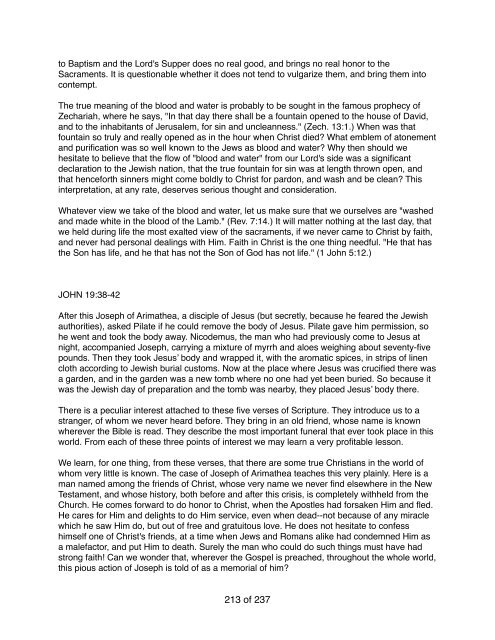J. C. Ryle John
John Charles Ryle (May 10, 1816 - June 10, 1900) was an evangelical Anglican clergyman and first Bishop of Liverpool. He was renowned for his powerful preaching and extensive tracts.
John Charles Ryle (May 10, 1816 - June 10, 1900) was an evangelical Anglican clergyman and first Bishop of Liverpool. He was renowned for his powerful preaching and extensive tracts.
Create successful ePaper yourself
Turn your PDF publications into a flip-book with our unique Google optimized e-Paper software.
to Baptism and the Lord's Supper does no real good, and brings no real honor to the<br />
Sacraments. It is questionable whether it does not tend to vulgarize them, and bring them into<br />
contempt.<br />
The true meaning of the blood and water is probably to be sought in the famous prophecy of<br />
Zechariah, where he says, "In that day there shall be a fountain opened to the house of David,<br />
and to the inhabitants of Jerusalem, for sin and uncleanness." (Zech. 13:1.) When was that<br />
fountain so truly and really opened as in the hour when Christ died? What emblem of atonement<br />
and purification was so well known to the Jews as blood and water? Why then should we<br />
hesitate to believe that the flow of "blood and water" from our Lord's side was a significant<br />
declaration to the Jewish nation, that the true fountain for sin was at length thrown open, and<br />
that henceforth sinners might come boldly to Christ for pardon, and wash and be clean? This<br />
interpretation, at any rate, deserves serious thought and consideration.<br />
Whatever view we take of the blood and water, let us make sure that we ourselves are "washed<br />
and made white in the blood of the Lamb." (Rev. 7:14.) It will matter nothing at the last day, that<br />
we held during life the most exalted view of the sacraments, if we never came to Christ by faith,<br />
and never had personal dealings with Him. Faith in Christ is the one thing needful. "He that has<br />
the Son has life, and he that has not the Son of God has not life." (1 <strong>John</strong> 5:12.)<br />
JOHN 19:38-42<br />
After this Joseph of Arimathea, a disciple of Jesus (but secretly, because he feared the Jewish<br />
authorities), asked Pilate if he could remove the body of Jesus. Pilate gave him permission, so<br />
he went and took the body away. Nicodemus, the man who had previously come to Jesus at<br />
night, accompanied Joseph, carrying a mixture of myrrh and aloes weighing about seventy-five<br />
pounds. Then they took Jesus’ body and wrapped it, with the aromatic spices, in strips of linen<br />
cloth according to Jewish burial customs. Now at the place where Jesus was crucified there was<br />
a garden, and in the garden was a new tomb where no one had yet been buried. So because it<br />
was the Jewish day of preparation and the tomb was nearby, they placed Jesus’ body there.<br />
There is a peculiar interest attached to these five verses of Scripture. They introduce us to a<br />
stranger, of whom we never heard before. They bring in an old friend, whose name is known<br />
wherever the Bible is read. They describe the most important funeral that ever took place in this<br />
world. From each of these three points of interest we may learn a very profitable lesson.<br />
We learn, for one thing, from these verses, that there are some true Christians in the world of<br />
whom very little is known. The case of Joseph of Arimathea teaches this very plainly. Here is a<br />
man named among the friends of Christ, whose very name we never find elsewhere in the New<br />
Testament, and whose history, both before and after this crisis, is completely withheld from the<br />
Church. He comes forward to do honor to Christ, when the Apostles had forsaken Him and fled.<br />
He cares for Him and delights to do Him service, even when dead--not because of any miracle<br />
which he saw Him do, but out of free and gratuitous love. He does not hesitate to confess<br />
himself one of Christ's friends, at a time when Jews and Romans alike had condemned Him as<br />
a malefactor, and put Him to death. Surely the man who could do such things must have had<br />
strong faith! Can we wonder that, wherever the Gospel is preached, throughout the whole world,<br />
this pious action of Joseph is told of as a memorial of him?<br />
213 of 237




